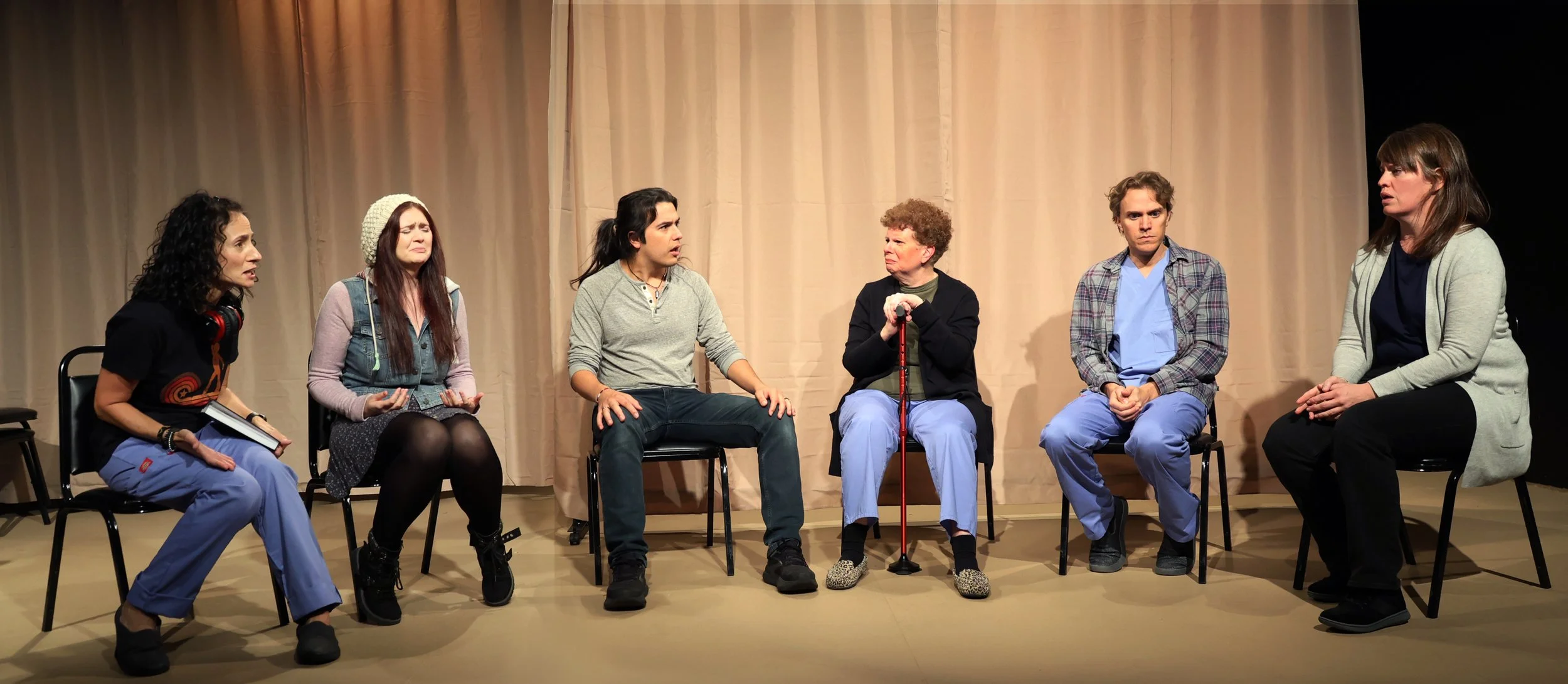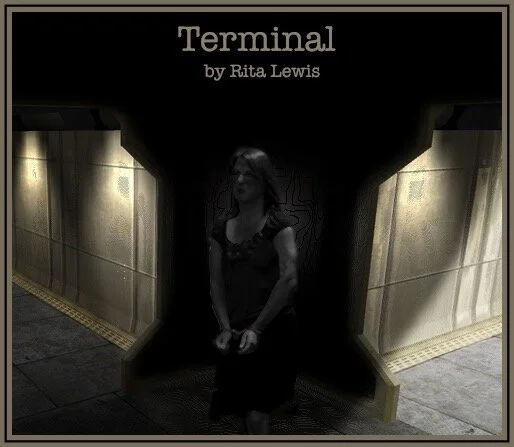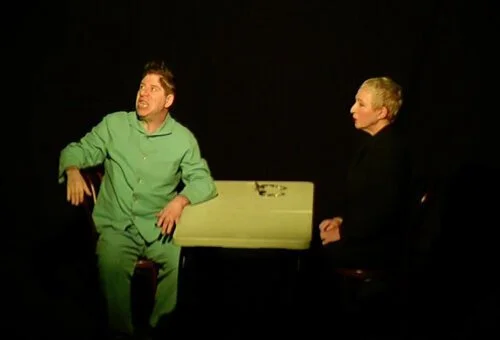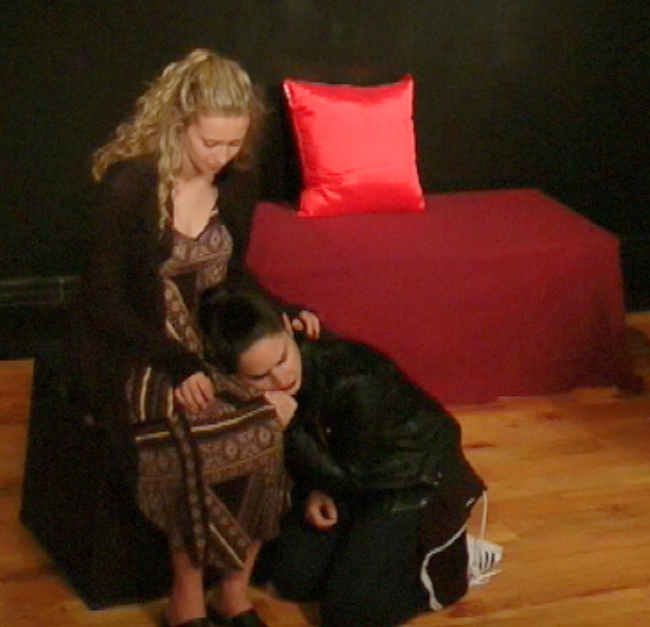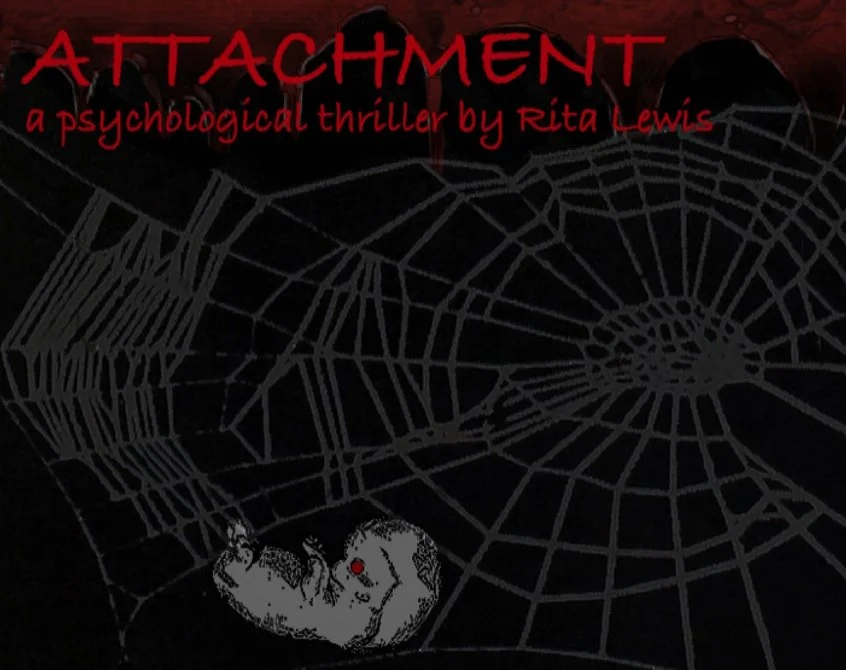What happens to the Group when the system fails?
Inside the group room of a long-term psychiatric facility, current and former patients gather to share personal stories, give mutual support, and provide a safety net for life’s difficulties. All works well until a corporation takes over the hospital and threatens its very existence. Behind the scenes, Liz, the group’s therapist, decides to fight the business mentality. But can a highly trained clinician match skills against an entity of acute intelligence and little heart?
Rawshock Review
by Darryl Reilly, TheaterScene.org
“Is there a better way to say she’s been in the nuthouse?” That is a helpful remark offered by a psychiatric patient during a group therapy session in aid of another member in playwright Rita Lewis’ searing topical drama, Rawshock. A supportive female psychiatrist oversees “The Inside/Outside Club,” these are five patients who meet up; some are long-term residents of a facility, and others are outpatients.
Ms. Lewis’ articulate characters are a cross-section of contemporary Americans; each are delineated through just enough biographical details; all are relatable and inspire empathy. The play is structured as short scenes mostly in the therapy room where traumas are recounted, solutions are offered, fights are fought, and camaraderie exists. “That took guts, I don’t think I could ever let it out like that, I just can’t.”
Conflict is established during the terse opening scene as the group’s psychiatrist confronts the male new head of psychiatry; he has been installed by the corporation who has recently bought the hospital. He is going to evaluate operations and make recommendations, there is anxiety as another nearby corporately acquired hospital has been closed. Of course, this new head of psychiatry will become pivotal in threatening the existence of “The Inside/Outside Club.”
Rawshock’s tales of those battling mental illness colliding with present-day corporate greed becomes a compelling morality clash due to Lewis’ exquisite command of dramatic writing. Her plot is quickly set in motion, exposition is imparted through precise and flavorful dialogue, and the satisfying realistic conclusion is wistfully ambivalent. Rawshock is a well-made play pungently dramatizing current social issues. It can be assumed that the title is a playful take on “Rorschach test.”
Director Ken Wolf’s exhilarating physical staging is marked by rapid pacing with fiercely choreographed sequences of physical violence and emotional outbursts. The actions vividly occur on the stage simply set with full-length beige curtains and a few key furnishings. Mr. Wolf’s straightforward lighting and sound design also contribute to the overall presentational effect of experiencing a Rod Serling-type landmark 1950’s Golden Age of Television live drama, as directed by the likes of Delbert Mann, Sidney Lumet and Arthur Penn. That entrancing dimension is enforced by the supreme cast Wolf has assembled and guided. For 80 minutes, each actor offers and sustains fearless characterizations, even when silently in the background.
The authoritative, yet approachable Camber Carpenter is serene as the heroic therapist with her appealing professional speech pattern and noble bearing.
Often banging a cane and bellowing, Theresa Della Valle recalls American acting titans Shirley Booth, Thelma Ritter and Eileen Heckart’s histrionic gutsiness with her heartbreaking portrayal of an upper class, former “bad girl” who is now an aged long-term institutional resident. Ms. Della Valle is shattering delivering a reminiscence of cutting up a mink coat belonging to one of her parents’ snooty high society friends.
Dressed all in black with flowing black hair, the thin, animated and alluring Jennifer Pierro is haunting as a disturbed artist off her meds; she is riveting enacting several harrowing breakdowns.
Chelsea Clark conveys tremendous pathos as a troubled young woman on the verge of a new start in life, attempting to obtain an office job. A grand highlight of Ms. Clark’s winning performance is a simulated job interview where clad in under-class finery, she gleefully engages in hilarious, swift corporate double talk while smoothly extricating herself out of questionable background minefields.
Her interviewer is the new head of psychiatry who is supposedly sympathetically observing the group; he is played with premier character actor verve by the august David Silberger. Mr. Silberger’s soothing cadences and mature everyman persona allow him to effortlessly veer from benevolence to treachery.
While his lustrous black ponytail sways as he swaggers around in jeans, Nathan Cusson is ferocious as a combative hothead patient. Mr. Cusson also displays this complex character’s tenderness with his affective performance as he steps up to help the group.
The blond and achingly voiced Christian Libonati beautifully combines intensity and weariness as a forlorn substance addicted male prostitute; his anguished turn inspires memories of Brad Dourif in One Flew Over the Cuckoos’ Nest. Mr. Libonati and Cusson have some galvanizing verbal and physical interactions together.
Rawshock intelligently explores its painful subject matter through blazing theatricality.
Review Link: https://theaterscene.org/2024/10/rawshock/
Jennifer Pierro, Chelsea Clark, Nathan Cusson, Theresa Della Valle, Christian Libonati, and Camber Carpenter
PhotoCredit: Chris Bentley
Christian Libonati, Jennifer Pierro, Dave Siberger, Nathan Cusson, Theresa Della Valle, Chelsea Clark and Camber Carpenter.
PhotoCredit: Chris Bentley
THE UNVEILING, semi-finalist, Stanley Drama award. Mainstage production, Arena Players Repertory Theater, New York.
Repressed family issues resurfacing.
TERMINAL, was produced at the Rhino Theatre in New Jersey as part of their 4th Annual One-Act Jamboree Festival, and was a semi-finalist for the 10th Annual One-Act play contest First Stages, Hollywood. It was subsequently produced at Manhattan Repertory theatre.
A futuristic drama containing warnings to society.
TERMINAL: Beyond the Red Door
A review by Constance G.J. Wagner
When a society is marred by violence, its citizens are driven to seek a solution, a means to an end. Terminal by Rita Lewis takes us to the dark heart of just such a society where lines are drawn to make things neat, simple – and resolved. Violent offenders are given what seems on a legislative level to be a humane resolution. A series of psychiatric interviews determines if such offenders are worthy of reintegration into society. Those who fail to meet the state’s expectations are not executed but instead condemned to a kind of coma until the body shuts down on its own.
This society takes pride in that it ostensibly has no death penalty. Their offenders are given every opportunity to show remorse before they are condemned to go through the red door where a type of living death awaits them. In this antiseptic, self-righteous society, the illusion of compassion is sufficient.
We are introduced to the official black and white thinking of this society in the person of psychiatrist Dr. Meredith Lawson, chillingly portrayed by Florence Pape. It is she who embodies the ethos of this society that takes pride in what is seen as fair treatment in a timely fashion. She is direct and matter of fact with the “clients” she is presented with through the program that employs her. There is a knife-like precision in the conversation she has with John, a serial killer, who sees it as his divine mission to send innocent girls back to God before their purity is sullied.
The dialogue between Dr. Lawson and her very disturbed client begins to expose just how this society works, much to the horror of John, here presented with an interesting mix of innocence and warped morality by Dave Silberger. He will not die by the hands of society. Only his higher brain functions will be shut down and actual dying is something his body will eventually accomplish on its own. This sentence is explained to him in a perfunctory fashion by Pape, whose delivery shows hints of the subtle frustration of the culture with offenders who don’t understand the mercy supposedly embodied in this method. Silberger also delivers an excellent portrayal of a man who tries to justify his actions while attempting to squelch his own rising panic.
There is, however, never any question as to who will come out on top in their sparring. Pape’s Lawson has seen all this before, and her calculated clinical approach is unnerving to behold, particularly since it seems to be so perfectly aligned with the culture’s expectations: Five sessions. No remorse yet? You’re done. A violent offender is off the streets and the state saves money that would previously have been spent housing and feeding yet another incorrigible prisoner. This is more humane than an outright execution. Yes, Dr. Lawson does believe that.
But then comes her next client, Cheryl Reed (Chelsea Clark), a woman convicted of stalking and killing the man who beat and raped her and threatened her child with the same fate. The conversation in session here reveals there are no shades of grey in this society. The rapist is a victim of violence – and that is all that matters. Would Cheryl kill her attacker again if she had the chance? Doesn’t she see that she is the violent offender now? Clark gives us a desperate woman who is struggling not just to save her own life but her psyche and the well-being of her daughter and ailing mother as well. She is ably partnered with Pape in the gripping debate of ethics versus morals that playwright Rita Lewis here presents.
The sharp and compelling dialogue forces the audience to consider what is right versus what is convenient. The question of what is correct for a society is on shaky ground here, and director Ken Wolf’s tight pacing makes the sparring fly by. The overall feeling is of claustrophobia – not so much for the offenders incarcerated but for the society that is trapped by its own black and white thinking about right and wrong.
Terminal, presented by Manhattan Repertory Theatre, gives us a world of sharp contrasts of thought that still reveal the shadows of the soul.
************
Thanks also to Jonathan Brantley for his contributions to the discussion about Terminal.
************
--- submitted by Constance G.J. Wagner, Writing Program Director, Saint Peter’s University (The Jesuit University of New Jersey)
Dave Silberger and Florence Pape
Chelsea Clark and Florence Pape
PAST PERFECT, a full-length play, Equity showcase Manhattan Repertory Theatre. Several performances added as benefits for various LGBTQ organizations.
An unusual, and at times farcical, resolution to a childhood conflict that separated two friends for decade.
Anthony J. Piccione
New York Theatre Critic
It’s not uncommon to see theatre explore issues concerning the LGBTQ community. Some of the best plays I’ve reviewed over the past year or so are the ones that do a superb job at doing exactly that. However, what I haven’t seen as often are plays which specifically focus of LGBTQ parents. Yet Past Perfect – a new full-length play written by Rita Lewis – attempts to do exactly that. Earlier in the year, I had been invited the review the show during its return to Manhattan Rep’s stage, and after a minor delay in this production’s return, I had the chance to get a glimpse this past weekend.
The play tells the story a mother and her teenage daughter, who deal with the return of the former’s past lesbian lover into the picture, and it comes at a time when the young daughter herself is just starting to explore romantic and sexual relationships for the first time in her life. At its core, it is a melodrama that contains a mix of both humor and sentimentality. The script isn’t perfect. Some of the lines occasionally feel awkwardly written, and I couldn’t help but feel the ending scene was a tad bit rushed. Nonetheless, it is still a mostly potent piece with a fascinating family story.
Admittedly, this is a rare production where not only is the playwright’s vision realized, but arguably enhanced, by the people working on the production itself. Under Artistic Director Ken Wolf’s direction, the atmosphere of the show often feels reminiscent of the Golden Age of Hollywood in the 1930s and 1940s, when melodramatic romance stories were at their peak in the world of film. The play is kept at a quick and energetic pace that kept the audience focused and engaged from beginning to end, the set design is simple but perfectly captures the scenery of the play, and even the lighting and sound transitions feel like their part of the theatrical experience!
In terms of the acting, the trio of women bringing these characters to life all make the most of what they are given from the playwright. In the role of Susan, Gerry Glennon’s strong emotions shine vividly, as she portrays someone who is torn between the role of concerned mother and of someone longing for love. Her daughter Julie is portrayed by Erika Yesenia, who does a very fine job at portraying the archetype that a role such as this seems to demand. Finally, Jennifer Pierro (who also serves as Manhattan Rep’s CEO and CFO) is both warm and passionate in the role of Susan’s former lover, Beth.
Unlike some other critics, I’ve never been a believer that melodramatic is a dirty word, so when I say that Past Perfect is a fairly well-done work of melodrama, executed perfectly by the cast and director, I mean that in the best way possible. While it describes itself as a story dealing with LGBTQ issues, it is ultimately a modern story of love, family and relationships that I think many people out there can probably relate to, to some extent or another, regardless of their sexuality. Presumably, this won’t be the last time this show runs at Manhattan Rep, so I’d certainly recommend that theatergoers keep an eye out, and consider seeing it during a potential future run.
Talkback about PAST PERFECT by Rita Lewis at Manhattan Repertory Theatre
Jennifer Pierro and Gerry Glennon
Jennifer Pierro,Erika Yesenia and Gerry Glennon
ALICE, produced at Manhattan Repertory Theatre.
A futuristic drama containing warnings to society.
Jessica Luhmann,Yvonne Cole, Michael Evan Werner
Jessica Luhmann and Yvonne Cole
THE FAIL, a ten-minute play, produced at the North Park Playwright Festival in San Diego California.
A futuristic drama containing warnings to society.
Gerry Glennon and Dave Silberger
Gerry Glennon and Dave Silberger
UNDERTOW, semi-finalist, (top 20 of 300 worldwide submissions), Lakeshore 10-Minute Play Contest.
Repressed family issues resurfacing.
Ita Korenzecher and Eva Bublick
Ita Korenzecher
ATTACHMENT, a full-length play, was developed and produced at Manhattan Repertory Theatre.
A psychological cat and mouse dynamic between a Nobel Prize winning scientist and a former patient seeking revenge.
Ita Korenzecher and Robert Lunde
Ita Korenzecher and Robert Lunde
THE FALLEN, The Looking Glass Theater Manhattan, workshop production, voted audience favorite for that weekend.
Staged Reading: At Abingdon Theatre, New York.
An 1870 western exploring women’s and societal issues that remain unresolved in modern society.
Staged Reading: IMPRINT,Abingdon Theatre, New York.


